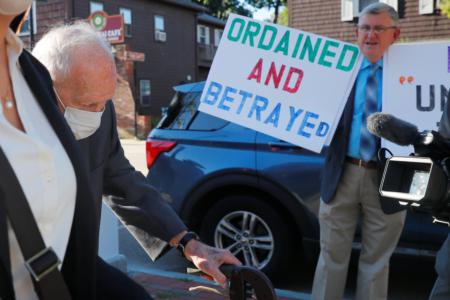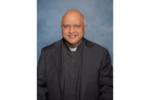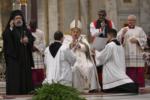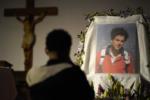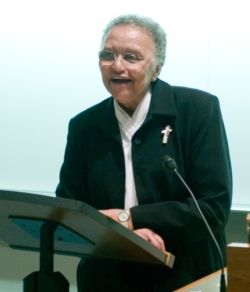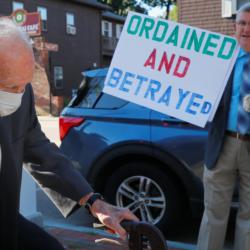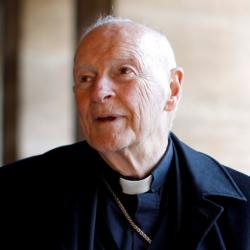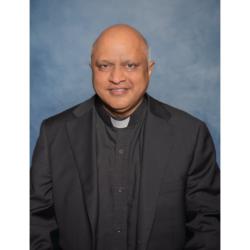Religious order still reeling from Katrina aftermath, says speaker
BOSTON -- With few resources and a strong desire to help the poor, the Sisters of the Holy Family, founded in New Orleans in 1842, face many of the same challenges encountered by their foundress, Sister Henriette Delille.
Since Hurricane Katrina destroyed everything the sisters had in New Orleans in September 2005, the sisters, like those before them, have faced homelessness and relied on the kindness of others to provide for themselves and the people they serve, Sister Sylvia Thibodeaux, SSF, told The Pilot prior to speaking at a fundraiser at Emmanuel College in Boston on Nov. 4.
“We are at a moment of refounding,” she said. “We have to start over again, and we are very much at this day and time the way we were when we were first founded.”
Sister Henriette, a free woman of African descent, founded the order 20 years before the Emancipation Proclamation. The first sisters served abandoned slaves, educated the children of slaves, and cared for the sick, the poor and the elderly, said Sister Sylvia.
She spoke of the similar position the Sisters of the Holy Family are now in post-Katrina.
When the levies gave way the order’s five facilities in New Orleans were destroyed, including their motherhouse, a high school, two independent living facilities for the elderly and the oldest continuous care nursing home in the United States, she said.
Today’s sisters face the additional challenges of significant mortgages on those properties and an aging membership. The median age of the order is 74, and there are few new vocations, Sister Sylvia said.
The future of the sisters will be different from where they were headed before Katrina, she added. They can no longer continue all of their ministries and do not know whether they will be able to rebuild.
“The city is very different. We don’t know what it’s going to be like,” she said.
The fundraiser, entitled “Tea with Sister Sylvia Thibodeaux,” was held to raise money for the Sisters of the Holy Family. The event began with organizers expressing their gratitude for Sister Sylvia’s visit and desire to assist her order. Many of them had been teachers at St. Joseph School in Roxbury where Sister Sylvia was principal for many years. The school closed in June 2003.
Theresa Perry, professor of African studies and education at Simmons College, greeted those gathered at the fundraiser, calling on them to remember the lives that were lost and permanently altered by Katrina and its aftermath.
“It is perhaps easy for us to forget that it was only a little over a year ago that New Orleans experienced the worst man-made disaster in our country’s history,” she said, referring to the levies that did not hold back flood waters.
She urged everyone to assist those in New Orleans who are still in need, saying, “The Catholic Church has not responded, the black Catholic community has not responded and the Christian community has not responded.”
Patricia Hill Collins, a professor of sociology at the University of Maryland, echoed the same sentiments. The decrease in the black population of New Orleans since the hurricane highlights the social inequality of the United States, she said.
“One year later, the tourist industry is bouncing back with 85 percent of the hotels opened. Yet only 50 percent of the hospitals are operational, 17 percent of public transportation is working and 23 percent of daycare facilities have reopened,” she said. “Clearly, only some people are being encouraged to come back.”
African Americans are again being “swept under the rug” and some people may use Katrina as an opportunity for “Negro removal” in the city, she said.
New Orleans needs to be developed in a way that is true to its culture and its black heritage, Hill Collins added.
In her address following Hill Collins, Sister Sylvia said that the Sisters of Holy Family are committed to helping rebuild the city and its culture.
“We will not allow the city to become a white city. The Sisters of the Holy Family will not stand aside and allow New Orleans to become a rich gambling city,” she said.
The poorest of the poor have received “shameful treatment.” They are displaced, homeless, separated from their families and have experienced contract defraud. The sisters hope to reestablish their service to the poor and the elderly as soon as possible, she added.
The order implemented its evacuation plan as Hurricane Katrina approached on Aug. 28, 2005 at 5:15 a.m. Most of the sisters were transported to a location north of the city. Others stayed behind with residents of the nursing home and independent care residents who had elected to ride out the storm, she said.
In the days after the hurricane both groups were traumatized. Those who left faced unfamiliar surroundings and no information about their fellow sisters in New Orleans. Those in the nursing home faced rising water and heat without electricity to run the air conditioners.
“The hurricane hit and the next day everything was all right. Everyone thought it was over until the levies breached,” said Sister Sylvia.
The 170 residents who lived on the first floor had to be carried up a flight to the sisters’ residence. Once the flooding began, even their backup generator failed.
“The water did not stay very long. It crossed the highway and went into our motherhouse, and the water remained there for two weeks,” Sister Sylvia said.
The residents lived there for a full week without air conditioning, and 14 died from the heat and humidity. Eventually the National Guard airlifted them out, and they have not returned since, she said.
Many of the sisters have also not returned to New Orleans. The older sisters are living in nursing homes north of the city. Forty-one of the 100 sisters who lived in the motherhouse have returned and are living on the second floor, which was not damaged by floodwaters.
Insurance only covers $1 million worth of the damage on all of the facilities. FEMA has promised $3 million to the rebuilding of the nursing home, but the estimated cost is $14 million, she said.
The sisters have also received support from many orders of women religious, other organizations and from students at Emmanuel College who helped clean the mold and mildew from the first floor of the motherhouse last spring.
“I think the best of the human person was demonstrated during that time,” Sister Sylvia said about the students’ visit.
Following the fundraiser, Safiya Salandy, one of the students who made the trip, said that she was glad to let the sisters know that people cared and wanted to help them.
“A lot of them were older, but they had so much energy. It was inspiring,” she said. “It really was a spiritual visit.”
